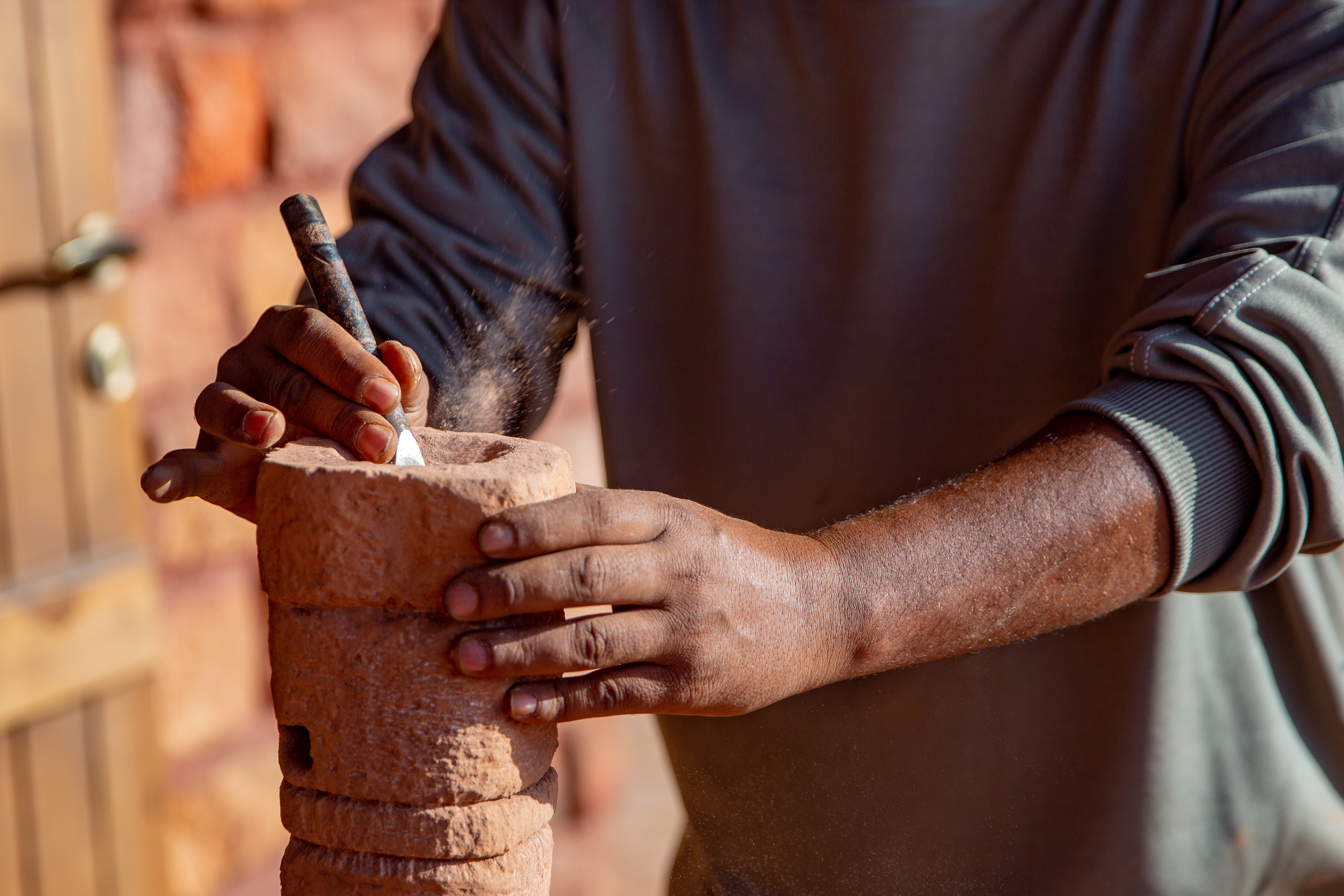Tourism
1. Develop a successful and re-sponsible global tourism desti-nation
tourism desti-nation
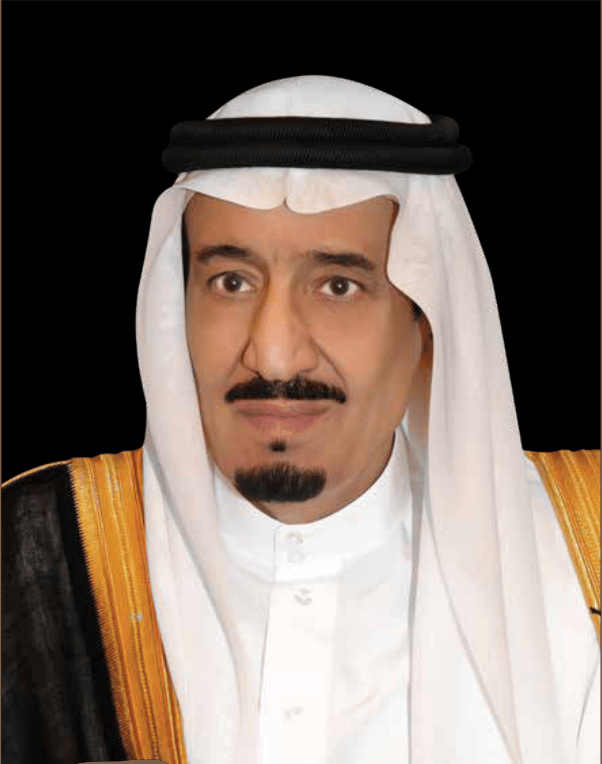
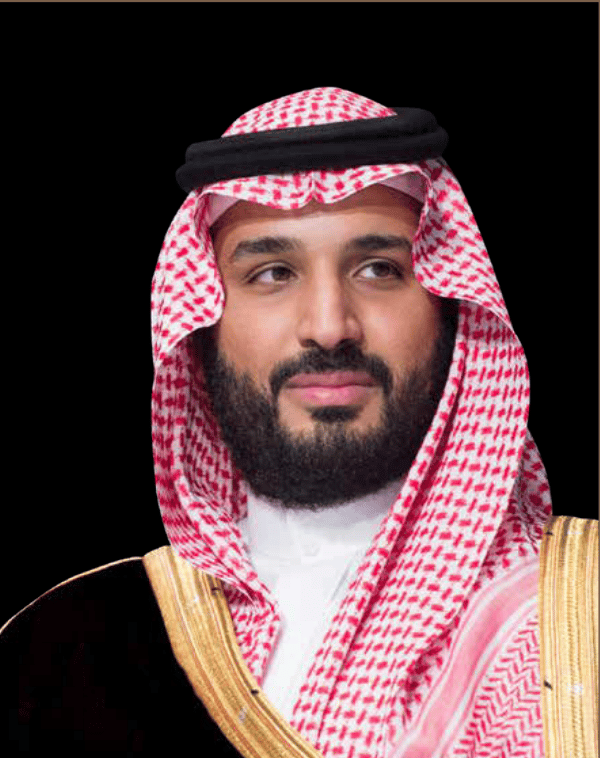
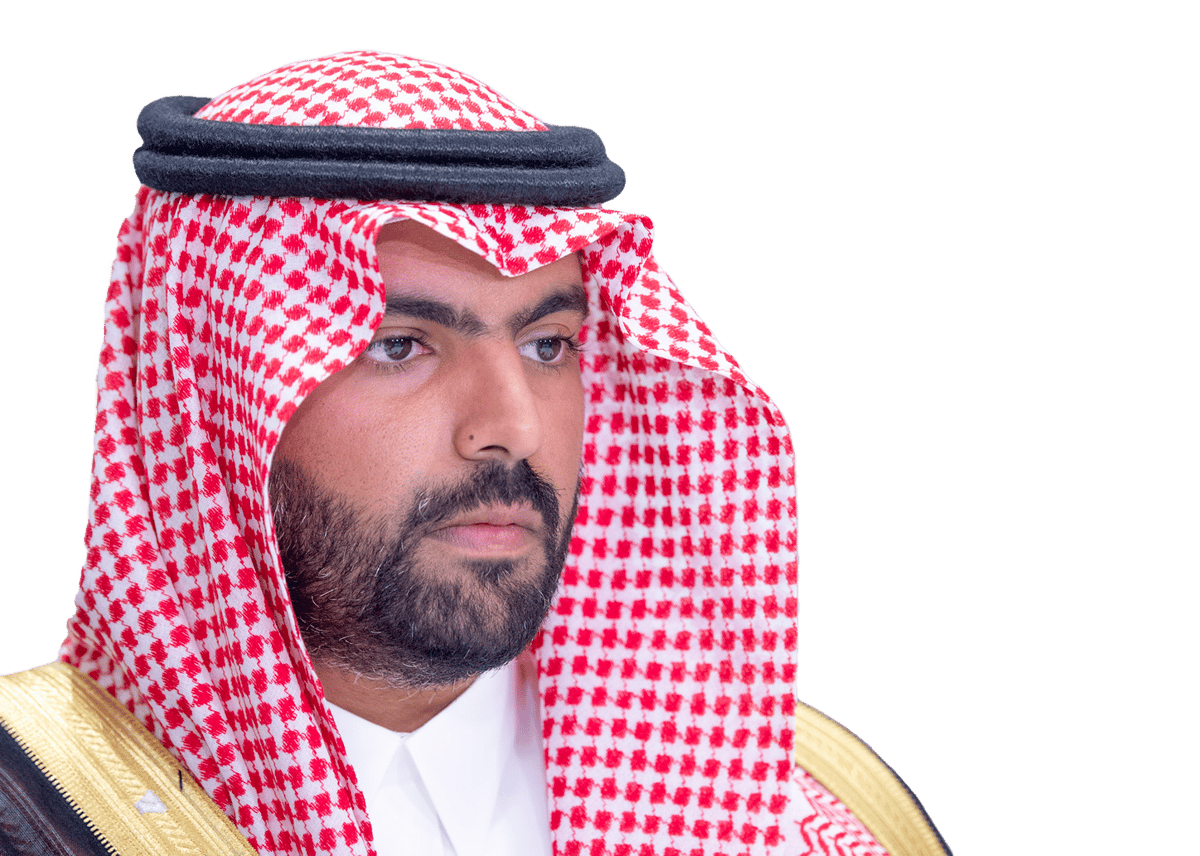
Speech of H.H the Governor of the Royal Commission for AlUla
With steady steps towards achieving the goals of “AlUla Vision” and in alignment with Saudi Vision 2030, the Royal Commission for AlUla (RCU) continues its journey of comprehensive and sustainable development in a region rich in deep-rooted history and diverse cultural and natural heritage. Our aim is to solidify AlUla’s status as a global destination for tourism, heritage and culture, under the guidance and support of the Custodian of the Two Holy Mosques and His Royal Highness Prince Mohammed bin Salman bin Abdulaziz Al Saud, Crown Prince, Prime Minister, and the Chairman of the Board of Directors of the RCU, and in partnership with the people of AlUla.
The year 2024 marked a remarkable path filled with exceptional achievements and strategic projects, reflecting our unwavering commitment to protecting AlUla’s rich heritage and captivating nature, while advancing sustainable development. These efforts included enhancing infrastructure, restoring historic mosques, developing healthcare facilities, improving energy and electricity systems, promoting environmental diversity through afforestation projects, and reintroducing wildlife into their natural habitats while protecting endangered species.
As part of an ambitious vision to elevate AlUla’s standing on the global cultural map, the city opened its doors to specialists and experts from around the world to discuss the future of culture and archaeology, foster cultural exchange, and host sporting events that reflect its heritage —further enriching its role as a hub for traditional sports. In addition, several significant archaeological achievements have also been realised, reinforcing the Kingdom’s position in the field of archaeology on a global scale.
The inauguration of luxury hotels and resorts has continued across the governorate, highlighting AlUla’s its authenticity and unique cultural legacy while enhancing its tourism infrastructure. The RCU remains committed to investing in and developing human capabilities through training, education, and scholarship programs across various fields.
In light of all that was accomplished in 2024, we extend our sincere gratitude and appreciation to our wise leadership for their continued support, to the people of AlUla, to our strategic partners who contributed to our success, and to our colleagues across all working teams for their tangible efforts behind every step of progress and achievement.
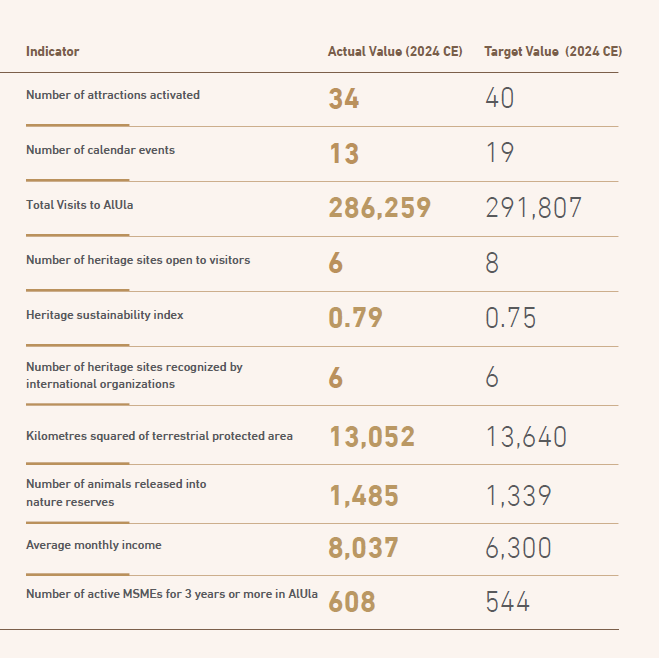
In 2024, AlUla witnessed a series of remarkable achievements that stands as a beacon of progress in the realms of development and sustainability. In alignment with Saudi Vision 2030, a set of strategic programmes and projects was implemented — driven by an ambitious vision rooted in the preservations of AlUla’s cultural and historical heritage, while advancing sustainable development that benefits both current and future generations. These efforts reflect the RCU’s commitment to long-term plans centred on a sustainable economy and eco-tourism. This is highlighted in the Commission’s annual report, which offers a comprehensive account of the year’s initiatives and accomplishments, summarized as follows:
The RCU’s Annual Report for the fiscal year (2024 CE/ 1445-1446 AH) comes in compliance with provisions of Paragraph (2) of Article (29) of the Law of the Council of Ministers, which stipulates that all ministries and other government entities shall submit to the Prime Minister, within ninety days (90) from the beginning of each fiscal year, a report outlining the achievements realised in comparison to the objectives stated in the general development plan for the preceding fiscal year, along with the challenges encountered, and proposals for improving workflow.
It is noteworthy that the RCU relies on the Annual Report Preparation Guide for Public Agencies in preparing its annual report, issued by the Council of Ministers under Resolution No. (233) dated 18/04/1443H, while adhering to the guidelines for publishing annual reports of public agencies issued by the National Centre for Performance Management (Adaa) dated 01/12/1444H
The Report covers the Commission’s strategic direction, key performance indicators, major accomplishments and activities, in addition to opportunities and challenges, governance framework, project contracts, Commission facilities, the budget report, and the final financial statement.
The report’s methodology was structured through the following phases:
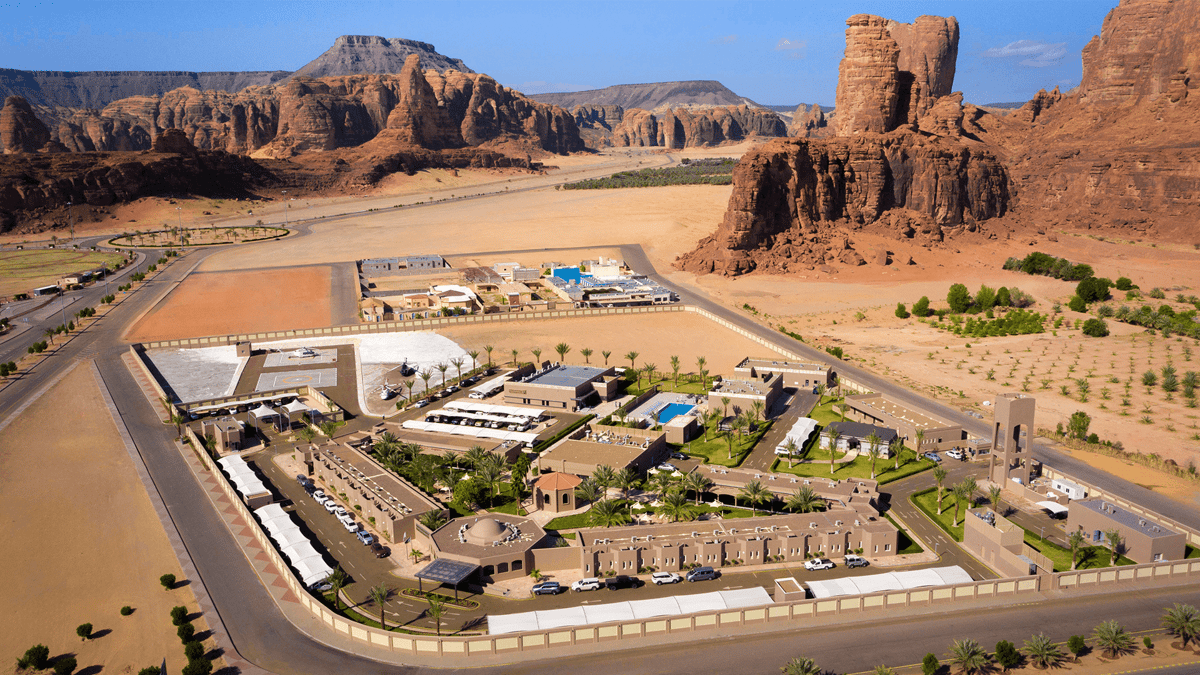)
The Royal Commission for AlUla
The RCU was established by Royal Decree No. (A/296) dated 26 Shawwal 1438 AH (corresponding to July 20, 2017). In pursuit of its vision, the RCU is committed to strengthening partnerships both locally and internationally, working alongside national and global experts to protect and preserve archaeological, heritage, and natural sites—ensuring the sustainable transformation of AlUla while safeguarding its environmental and historical assets.
The RCU works hand in hand with the local community, investing in its potential and providing education, training, and employment opportunities for all, with the aim of building generations that view knowledge as a foundation for sustainable growth.
The development plan for AlUla focuses on enhancing infrastructure and tourism facilities as key pillars of success, while preserving the region’s breathtaking landscapes and historic landmarks.
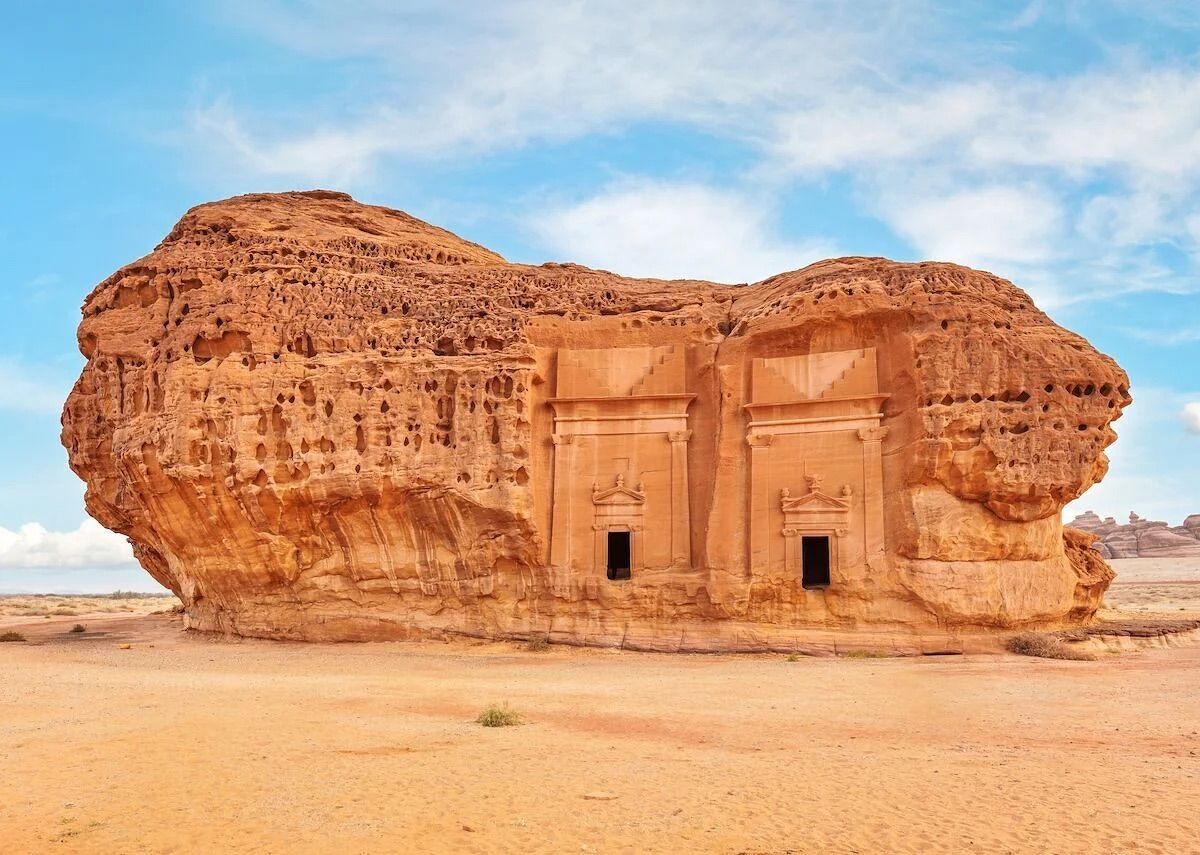
About AlUla
Located in the northwestern region of the Kingdom of Saudi Arabia, approximately 300 kilometers from Madinah, AlUlah is an extraordinary destination rich in natural and human heritage. It features a lush oasis valley, towering sandstone mountains, and ancient cultural sites dating back to thousands of years. Among its most renowned landmarks is Hegra, the first Saudi site inscribed on the UNESCO World Heritage List. Hegra was a major city in the Nabataean Kingdom, famous for over 100 well-preserved monumental facade tombs. The tombs are carved from the sandstone outcrops that surround what was once a walled urban settlement.Recent studies indicate that it also marked the southernmost outpost of the Roman Empire.
AlUla is also home to numerous historical and archaeological wonders, including Al Khuraybah (ancient Lihyan /Dadan), the capital of the Dadan and Lihyan Kingdoms, and thousands of rock art panels and inscriptions representing various ancient civilizations such as the Safaitic, Aramaic, Thamudic, Minaean, Greek, and Latin cultures. For instance, Jabal Al Aqraa features more than 400 Arabic inscriptions, while Jabal Ikmah is considered one of the largest open-air libraries in the Kingdom, containing important writings and inscriptions from the Dadan and Lihyan civilizations.
Today, multiple team of local and international archaeologists are actively working to document, register, and develop AlUla’s archaeological and historical sites. These efforts aim to support sustainable transformation and enable local, regional, and international visitors to explore and appreciate the richness of AlUla’s cultural, historical, and natural legacy, along with its deep-rooted values and civilizations.
The RCU’s vision goes beyond tourism development, encompassing broader fields aimed at creating thousands of jobs by the year 2023. In addition to tourism, eight keys sectors have been identified: goal of providing thousands of jobs by 2035. These are:
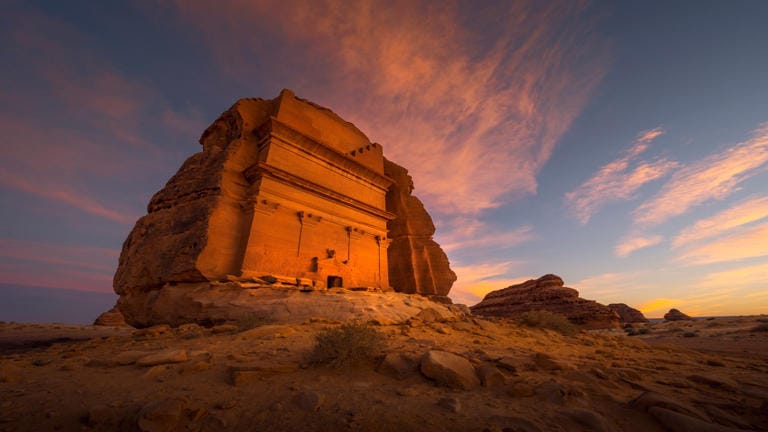
AlUla - a cultural landscape, A journey through time in the largest open museum
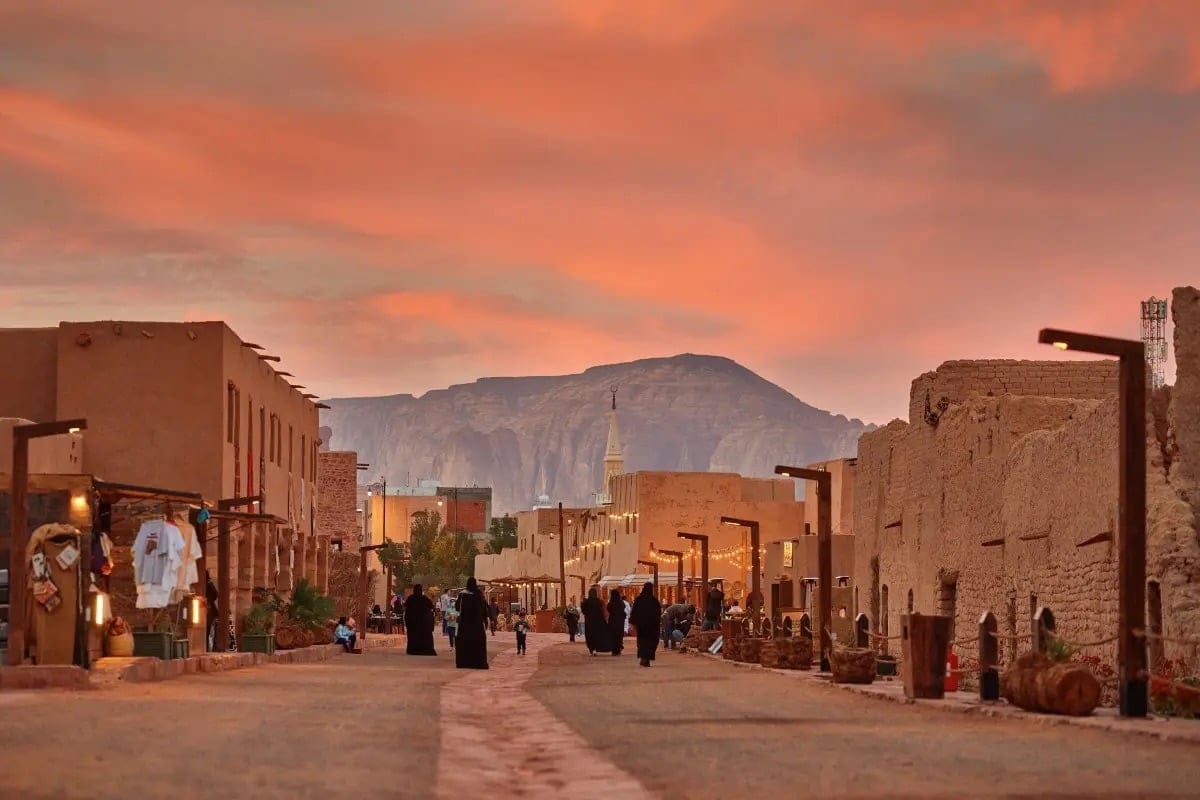
To enable AlUla development for its communities and visitors through regenerating and protecting its cultural landscape and providing quality of life
Strategy implementation Phases
Building a luxury brand through:
Unleash the potentials of the proposed value through:
Grow capacity and competency through:
The RCU’s vision goes beyond tourism development, encompassing broader fields aimed at creating thousands of jobs by the year 2023. In addition to tourism, eight keys sectors have been identified:goal of providing thousands of jobs by 2035. These are:
Strategic Principles
Relevant RUC’s KPIs
. Tourist Satisfaction in AlUla experience
. Net Promoter Score Index
. Cumulative added value from tourism sector
. Number of new jobs created in the tourism sector
. Number of heritage sites available for visitation
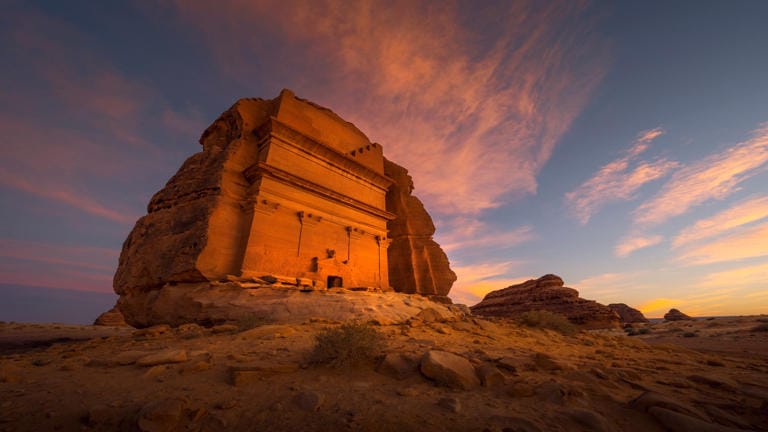
Relevant RCU KPIs:
. Number of plant species reforested in AlUla
. Number of Animals Released into Nature Reserves
. Area of rehabilitated grazing areas within AlUla
. Number of Kilometers of Protected Areas
In 2024, the RCU continued its journey to empower and develop AlUla by revitalising the natural and cultural environment and enhancing the quality of life, in line with its strategic vision and the objectives of Saudi Vision 2030 to position AlUla as a global destination on the cultural tourism map.
In this context, significant progress was made through the implementation of a range of high-impact projects, funded through dedicated portfolios across the RCU’s sectors and administrative units. These efforts have strengthened AlUla’s growing presence, supported tourism, sports, and environmental diversity initiatives, and fostered creative and artistic talent, along with capacity-building opportunities—all within an institutional framework that ensures comprehensive and sustainable development, as will be further outlined.
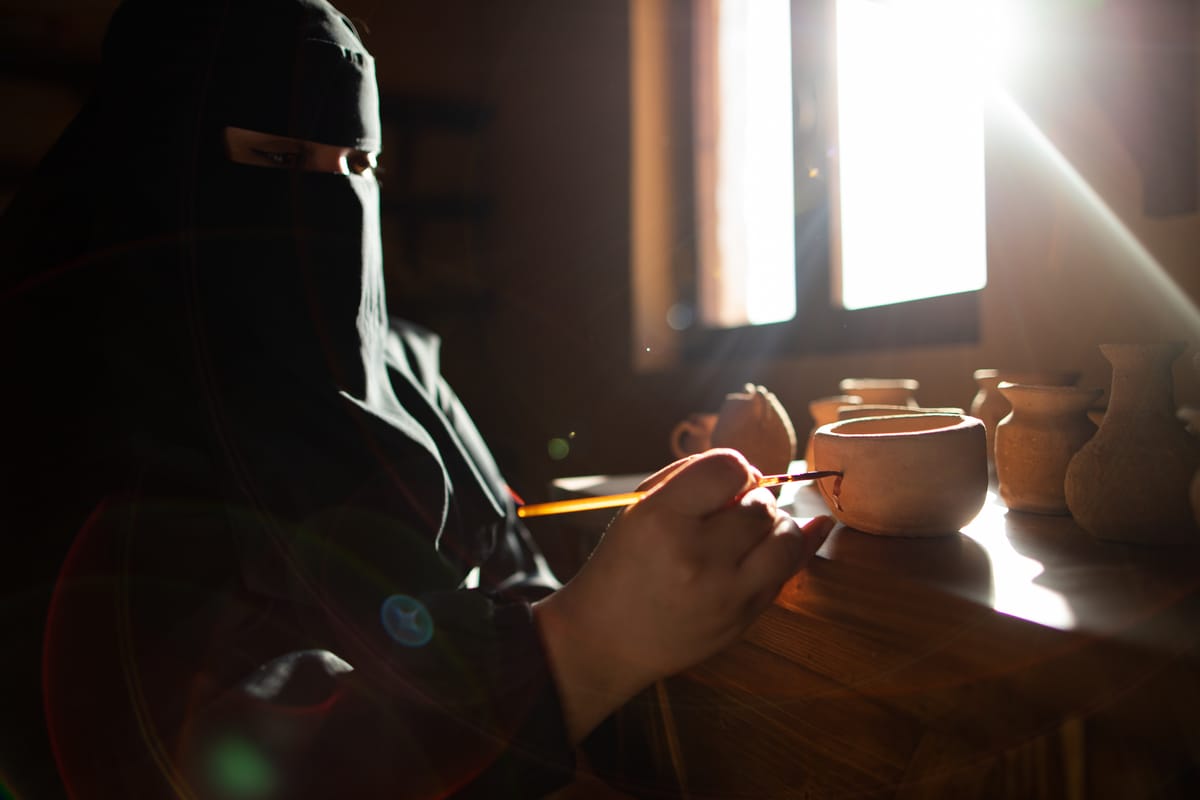
In 2024, the RCU launched its renewed visual identity, reflecting its strategic direction and core values that focus on sustainability as a central pillar of its modernization efforts. This step embodies the RCU’s firm commitment to sustainability, through the adoption of a new symbol designed to represent sustainability as a visual element that conveys progress and continuity across all its fields of work
The new visual identity reflects the RCU’s unwavering commitment to striving for excellence and setting high standards of quality and expertise, with the aim of building a pioneering governorate that becomes a model to be emulated.
The logo carries deep connotations that reflect the identity of AlUla as a meeting point of civilizations and a centre of ancient history in the northwest of the Kingdom. The lines heading to the right in the upper part of the logo symbolize growth, sustainability, and progress, while the three lines at the bottom point to the rich natural and cultural environment, including the terrain and mountains of AlUla.
The identity also serves as a reminder to all partners and members of the local community of the RCU’s ongoing commitment to finding sustainable solutions that ensure the preservation of AlUla’s heritage and its positive impact on future generations.
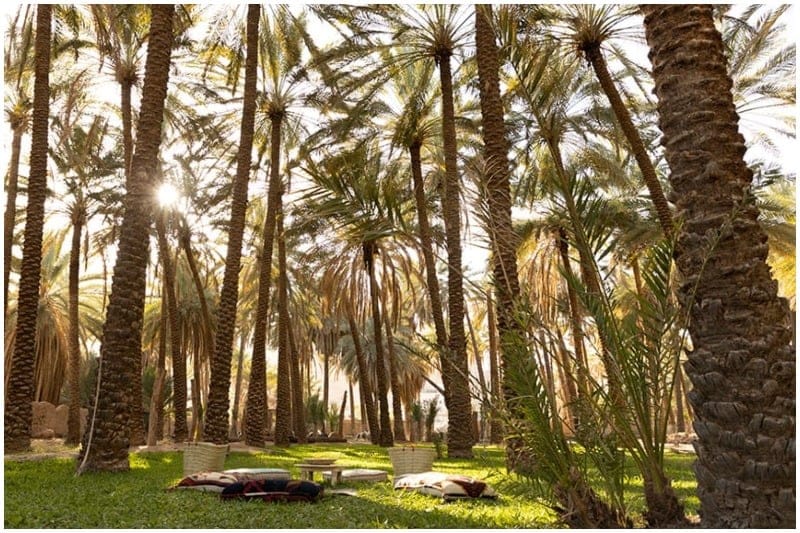
RCU launched its first annual sustainability report, marking a significant step in its journey towards achieving environmental, social, cultural, and economic sustainability. This report serves as a strong foundation for the RCU’s approach to sustainability reporting, providing a clear and transparent framework for documenting the RCU’s commitment and efforts toward sustainability across various sectors.
This report represents an important starting point for the RCU’s journey in sustainability reporting, which is a key part of its strategic vision. Through this report, the RCU seeks to improve its performance and strengthen its long-term commitment to sustainability. With the release of this report, the RCU reinforces its position as a trusted leader in the field of sustainability and affirms its determination to continue improving its positive impact on the environment, society, and economy in AlUla, while providing a solid foundation for building future reports that reflect the progress achieved year after year.
This report includes accurate and comprehensive information on the environmental, social, cultural, and economic dimensions on which the RCU focuses, in addition to governance, while highlighting its deep commitment to its responsibilities towards the local community and the environment. The report showcases the RCU’s efforts to achieve the Sustainable Development Goals and its role in preserving the rich cultural heritage of AlUla, providing a better life for its community, and supporting economic growth in a balanced and sustainable manner.
This report also represents a pivotal step towards building an integrated and transparent framework for documenting the RCU’s commitment to the principles of sustainability since its inception across various strategic dimensions. It also reflects the RCU’s efforts in multiple areas, including governance and cultural, social, economic, and environmental dimensions, which have been carefully selected to ensure a balance between the development of AlUla and the preservation of its identity and resources for future generations. The report provides a comprehensive sustainability framework based on 4 main dimensions, 16 pillars, 47 themes, and 56 performance indicators, and reinforces an effective governance framework that ensures the continuity and monitoring of activities and works in accordance with sustainability standards. This approach enables the RCU to accurately measure and evaluate its progress in the field of sustainability, and identify strengths and areas that require improvement, which contributes to making informed and effective decisions.
04 Dimensions
16 Pillars
56 Key Performance Indicators
47 Themes
This report has been prepared based on a set of recognised international standards and frameworks to ensure transparency and credibility, including:
The Environmental Awareness Campaign – Strategy & Implementation Plan project served as the cornerstone for the Saon AlUla Campaign, a key initiative aimed at fostering long-term behavioral change surrounding sustainability issues within AlUla County. This foundational effort is designed to inspire and drive meaningful shifts in local practices, with the ultimate objective of promoting environmental stewardship and sustainable development across AlUla.
• Focusing on public and environmental issues where increased awareness can lead to a tangible impact
• Targeting community segments that can amplify the message and foster wider interaction
• Leveraging influential stakeholders as channels to communicate the message to other groups
Highlighting potential partnerships within and outside the RCU at the Kingdom level to ensure a sustainable success
• Highlighting the special requirements for the infrastructure and organizational structure needed within the RCU to encourage appropriate behaviours and change
- Focusing on the intellectual motivations of each stakeholder group
- Linking emotional motivations to societal goals to enhance commitment
The campaign uses a multi-layered, phased framework for communication across multiple channels targeting different groups. In that framework, key messages are conveyed through tangible and digital means, including a website, newsletters, emails, and social media, in addition to videos on YouTube to ensure access to different segments and achieve a lasting impact.
The “AlUla Awareness” campaign is distinguished by an integrated visual identity that includes a name, logo, and visual system that reflects its goals and supports its messages. Through this approach, the campaign aims to achieve positive and sustainable change that promotes the awareness of the local community in AlUla of the importance of protecting the environment and supports AlUla’s vision as a sustainable destination.
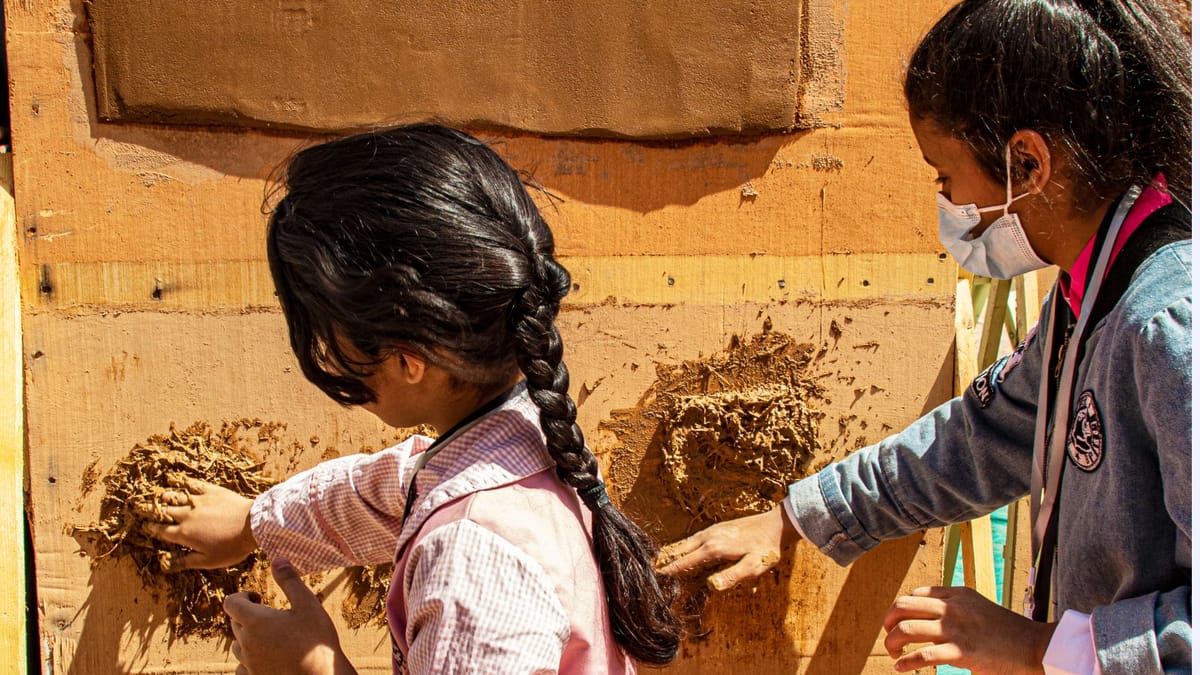
It is worth noting that since the launch of the campaign in 2024, the RCU has started taking swift action for immediate environmental results and greater awareness. This has been achieved via a series of initiatives that reflect the RCU’s commitment to translating sustainability principles into action and spreading awareness among various segments of society. Below are some of the initiatives that have been implemented so far:
• Conscious Generosity Campaign: This campaign aims to spread the culture of conscious consumption and reduce waste by raising awareness among individuals and organisations about the importance of sustainability in giving and sharing. Through this campaign, behaviors that contribute to preserving resources and promoting the concept of responsible giving were encouraged
• A school students’ visit to the agricultural waste recycling facility in the Mughira area:
An educational visit was organised for the students to the agricultural waste recycling facility in Mughira, where they were introduced to the stages of converting this waste into high-quality agricultural fertilisers. This visit aimed to demonstrate a practical application of the circular economy principle and support the local product as sustainable solutions to enhance environmental conservation and the sustainability of its resources
• Development and distribution of educational materials for schools: As part of the campaign’s educational objectives, educational materials were developed for schools to raise awareness about adopting environmentally friendly practices, water consumption, and waste reduction. These tools aim to promote environmental values among students at an early age, contributing to building a generation aware of the importance of natural resources
In commitment to the RCU’s role in achieving Saudi Vision 2030 and the Saudi Green Initiative’s objectives, the RCU participated this year in several new projects and made progress in other initiatives that were reviewed in previous years, providing a clear roadmap for the RCU’s directions regarding the Saudi Green Initiative’s objectives.
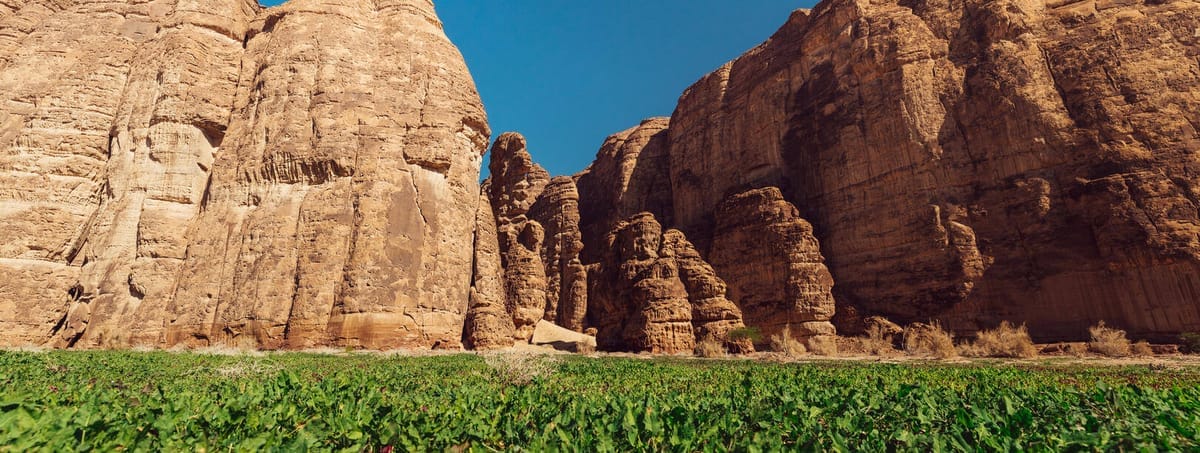

The projects include some examples and practical applications that reflect the RCU’s commitment to the eleventh strategic principle (circular economy) and the twelfth strategic principle (incorporating resilience). During 2024, the RCU worked on many projects and initiatives, during which it registered seven approved initiatives with the Saudi Green Initiative Secretariat. These initiatives contribute to the achievement of the Saudi Green Initiative’s objectives and the realization of the aspirations of Saudi Vision 2030. The projects can be reviewed as follows:
RCU’s Board of Directors is fully committed to fulfilling its duties and responsibilities in accordance with RCU’s Regulation. It oversees the governance framework of RCU and its Subsidiaries, sets the strategic direction, ensures compliance with applicable laws and regulations, and provides the necessary support to the executive management. This is accomplished by leveraging the expertise of the Board and its Committees.
RCU has established several affiliated entities as operational and investment arms that contribute to developing its strategy and achieving what serves its interests. These entities are: Visual and Contemporary Arts Museum Company, AlUla Peregrina Trading, AlUla Sports Club Company, and the Arabian Leopard Fund.
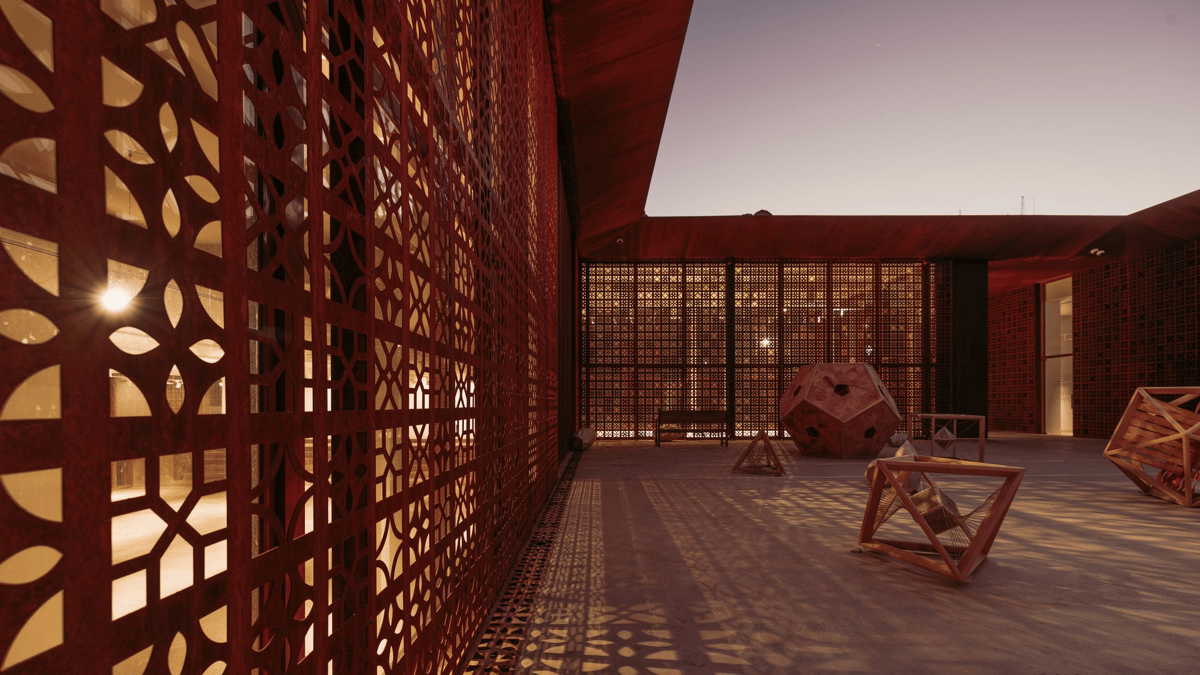
The RCU has prepared the content of the 2024 Annual Report in accordance with the Law of the Council of Ministers, presenting the achievements realised, the challenges encountered, and the proposed recommendations for improving operational performance. This was done following a detailed methodology in line with the Annual Report Preparation Guide for Public Entities.
Looking ahead to 2025, the RCU remains committed to creating a lasting impact on the national economy by focusing on destination development through infrastructure upgrades and investment in core hospitality assets. It will also work to enhance governance services, and solidify standards for improving quality of life and visitor experience.
RCU is to implement forward-looking strategies with clear priorities for Phase Two, including the execution of land acquisition programmes to support development, and the protection of culture and nature through restoration initiatives, the continued operation of the Arabian Leopard Breeding Centre, and nursery management. It will also manage cultural sites while sustaining creative industries.
RCU will also continue to develop the community through impactful initiatives, expanded wellness programmes, increased national employment, enhanced education and healthcare pathways, workforce development, and improved quality of life and public services.
Moreover, RCU will further strengthen economic and investment growth by facilitating investment opportunities, encouraging private sector participation, supporting local businesses and SMEs, and prioritising training and capacity building. It will also continue to enhance governance and regulatory frameworks to ensure compliance with international standards and active engagement with stakeholders to effectively implement Phase Two of its strategy.
In conclusion, RCU looks forward to a new year of continued accomplishments, driven by dedicated efforts and united teams under the leadership of the Kingdom—towards achieving a thriving economy.
